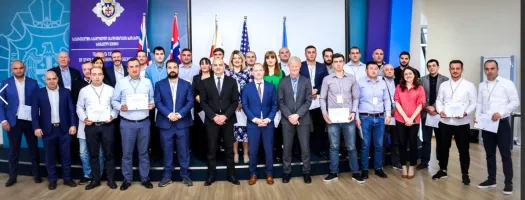On 16-19 May, the team of trainers from Georgia, who were trained under the CONTACT Black Sea project with the support of the United Nations Interregional Crime and Justice Research Institute (UNICRI), conducted their first national training on combating trafficking of radiological and nuclear (RN) material. The training was held at the Training Center of the State Security Service of Georgia (SSSG) and was attended by 17 participants from various Georgian institutions including SSSG, the Ministry of Internal Affairs, the Border Police and the Agency of Nuclear and Radiation Safety.
This was the final training activity conducted within the framework of the CONTACT – Black Sea project in Georgia. Its goal was not only to enhance capacities of security and law enforcement personnel on counter RN trafficking related issues, but also to put in practice their training delivery skills which were acquired during the previously conducted national and regional Train-the-trainers’ (TTT) courses.
The event was facilitated by the experts from UNICRI who mentored the Georgian team of trainers during the preparatory period. Trainers were invited to share their expertise and use their subject-matter knowledge as well as a wide range of training delivery skills and techniques introduced during the TTT sessions. To ensure sustainability of the CONTACT-Black Sea project, the training curricula was designed to be fully or partially incorporated into the different RN related training programs of the Georgian training institutions. The knowledge acquired in countering RN trafficking will therefore continue to be transferred over the years.
“Representing one of the major donors of the CONTACT project, it has been very interesting for me to attend the training in person. The threat of nuclear terrorism is a global concern and for this reason the Norwegian government is engaged in preventing illicit trafficking in the Black Sea region. I am impressed by how the training was performed as well as by the skills and interest of participants from different Georgian authorities in gaining knowledge to be able to enhance their capabilities to prevent and detect nuclear smuggling,” said Mr. Ingar Amundsen, Head of Section for International Nuclear Safety and Security at the Norwegian Radiation and Nuclear Safety Authority.
“Four years ago, we were discussing with the Black Sea countries their counter RN trafficking priorities that eventually made their way into the CONTACT – Black Sea project. One of the main concerns was that the knowledge and expertise developed by Georgian, Moldovan and Ukrainian officials would have been lost after experienced officers would have retired or would have moved to different assignments. The CONTACT – Black Sea addresses these concerns by creating sustainable mechanisms for the know-how to be passed on to new generations of security practitioners. This week concludes the journey initiated one year ago: Georgian trainers underwent a thorough train-the-trainers process, they had the opportunities to expand their knowledge and their skills through multiple and diverse training sessions.
We are very impressed by the progress and the hard work made by the Georgian trainers, and we are sure they will greatly contribute to maintaining and disseminate knowledge, and ultimately strengthening Georgia’s ability to prevent, intercept and respond to trafficking of RN materials,” said Mr. Francesco Miorin, Programme Officer at UNICRI, CBRN Risk Mitigation and Security Governance Programme.
Background information
On the 1st of June 2020, UNICRI officially launched the project “CONTACT - Black Sea: Enhancing capacities to prevent the trafficking of radiological and nuclear material in the Black Sea region”. The project aims to enhance the capacities of security and law enforcement officials in Georgia, Moldova and Ukraine to prevent and counter trafficking of radiological and nuclear material and foster regional cooperation and exchange of information on RN trafficking-related incidents. The project is implemented by UNICRI and is jointly funded by the United Kingdom Department for Business, Energy and Industrial Strategy (UK BEIS); the Norwegian Radiation and Nuclear Safety Authority (DSA); and the U.S. Defense Threat Reduction Agency (DTRA). The National training in Georgia will be followed by the National training in Moldova and Ukraine, the latter depending on the situation in the country.


